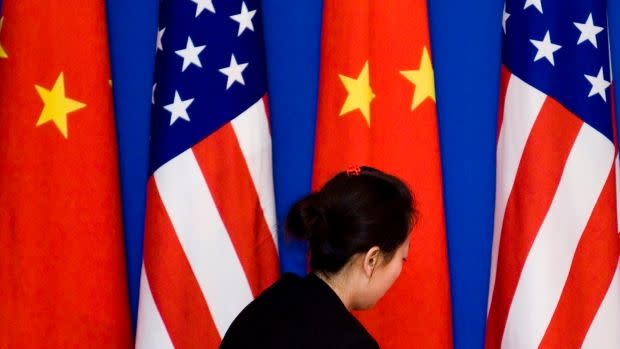Taiwan beat China to congratulate Joe Biden and Kamala Harris
- Oops!Something went wrong.Please try again later.
- Oops!Something went wrong.Please try again later.

A slew of global leaders have been quick to congratulate Joe Biden on his election as the next US president, including Tsai Ing-wen, the leader of Taiwan. China’s not among them.
Chinese president Xi Jinping has so far held off sending a congratulatory message to the new US president, a reflection of the fact that while Taiwan sees the US as a strategic supporter, China sees it as a rival regardless of who’s in charge.
Taiwan’s Tsai welcomed Biden’s win just a day after the Democratic candidate and running mate Kamala Harris, the first female US vice president, declared victory on Saturday (Nov. 7). Tsai retweeted Biden’s message to her when she was reelected to a second term in January, and nodded to their shared values as democracies.
Now it is my turn to extend congratulations to @JoeBiden & @KamalaHarris on being elected President & VP-elect. The values on which we have built our relationship could not be stronger. I look fwd to working together to further our friendship, & contributions to int’l society. https://t.co/xIvit7emjH
— 蔡英文 Tsai Ing-wen (@iingwen) November 8, 2020
No official statement has been issued by China’s foreign ministry, nor carried by the state-run People’s Daily, the party’s newspaper.
Hua Chunying, a spokesperson for China’s Foreign Ministry who is active on Twitter, has also not congratulated Biden, nor has Cui Tiankai, China’s ambassador to the US.
On Monday, when Wang Wenbin, a spokesperson for the Chinese foreign ministry, was asked at a regular media briefing why Beijing hadn’t congratulated the winner, he responded carefully that China “had noticed that Biden has declared victory,” and that it understands the election results will be determined according to US laws and procedures. Regarding China’s reaction to Biden’s victory, the country will follow international convention, said Wang without elaborating.
Trump has so far declined to concede, and made accusations of voter fraud regarding states that Biden won, without supporting evidence.
This is a cautious and slight support for Trump's claims. https://t.co/y8EgbEsPeY
— Michael Anti (@mranti) November 9, 2020
In contrast, in August, Xi sent a congratulatory message to Belarus’s Alexander Lukashenko soon after an election that was marred by accusations of vote-rigging against the long-ruling dictator.
Online, though, many discussed the election. On social media platform Weibo, the top hashtags on the US election included “Biden gave the first national speech, “there are both protests and celebrations in the US,” and “Melania Trump’s suggestion for Trump to accept his failure,” a reference to a CNN article on the first lady and son-in-law Jared Kushner advising Trump to concede. Another popular hashtag referred to Twitter’s stance that the “public interest” exemption it had carved out for Trump, to avoid banning his threatening tweets, wouldn’t apply to him once he’s an ordinary citizen, with some inviting him to come over to Weibo instead. Clips of clashes between Trump and Biden supporters, promoted by state-owned media such as CCTV, are also circulating, prompting some users to ask if there will be another civil war in the US.
The reactions from Taipei and Beijing offer a snapshot of the two regimes’ vastly different attitudes toward the US—and one of Biden’s toughest foreign policy challenges.
Taiwan is already seen by some as the next frontier of the US-China standoff, and has long seen the US as an important ally that can counter China’s increasing influence globally. Beijing has pushed the international community to avoid recognizing Taiwan as a country or including it in global institutions, and insists the self-ruling island is part of its own territory.
Trump set the tone early on the US-Taiwan relationship by calling Tsai when she was first elected president in 2016, stirring anger from Beijing. While some in Taiwan are dismayed over Trump’s defeat, Tsai’s message made it clear to her people, and to Beijing, that the US-Taiwan relations is far deeper than any one leader.
China, for its part, has watched the US election with calm and bemusement. In part its relative detachment is due to the belief that Biden will continue the Trump administration’s tough stance on China in areas like human rights and trade, with many in China arguing that the era of deep engagement between the US and China is now largely over. Nevertheless, China should seek to communicate with the Biden administration “as thoroughly as it can” to try to remove some uncertainty from their relations, said a Global Times editorial published yesterday (Nov. 8).
Elsewhere, British leader Boris Johnson, Canadian prime minister Justin Trudeau, and leaders from Australia and South Korea have congratulated Biden and Harris, while Russia and Mexico have also held back.
Still, even as China’s official strata remained silent, the yuan appears to have welcomed Biden already, in hopes of a less tumultuous period ahead.
Update: This post was updated on the day of publication with quotes from China’s foreign ministry and social media.
Sign up for the Quartz Daily Brief, our free daily newsletter with the world’s most important and interesting news.
More stories from Quartz:
